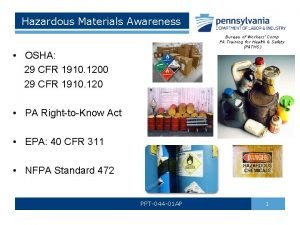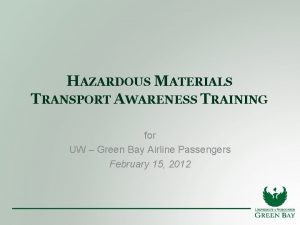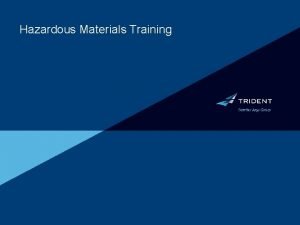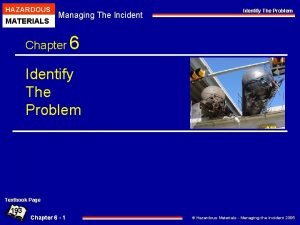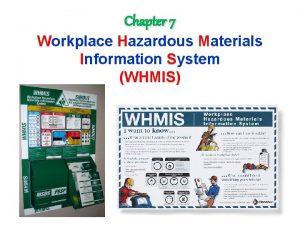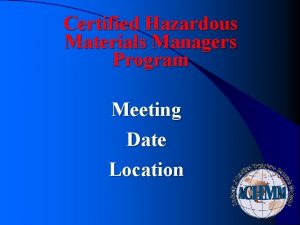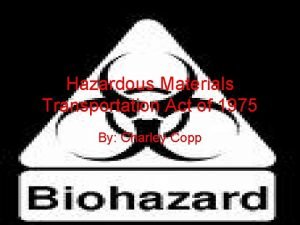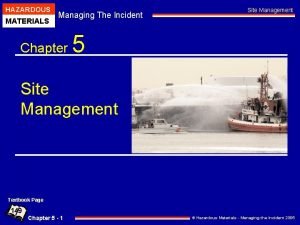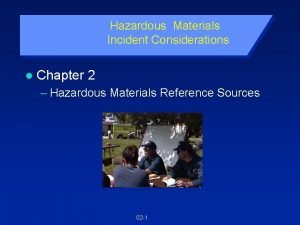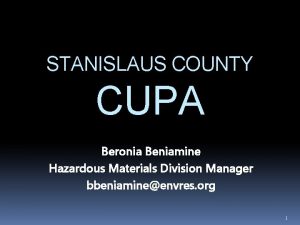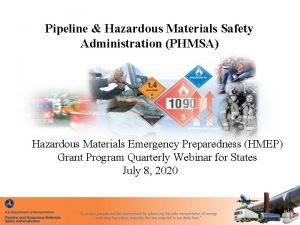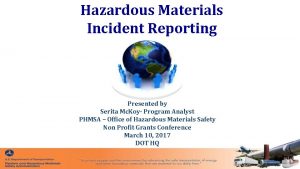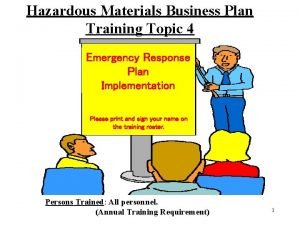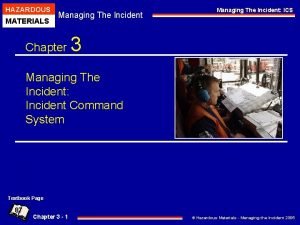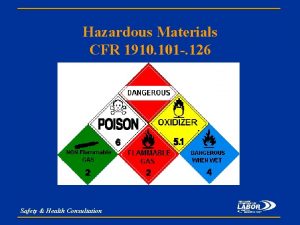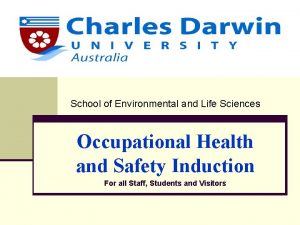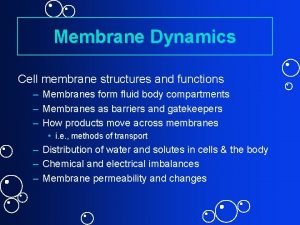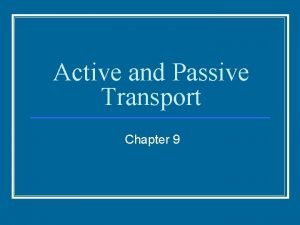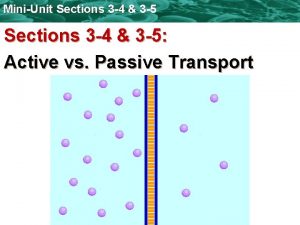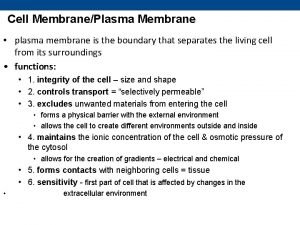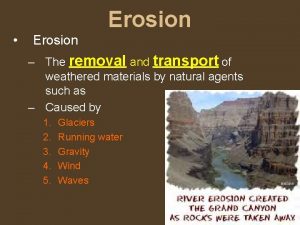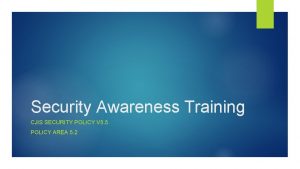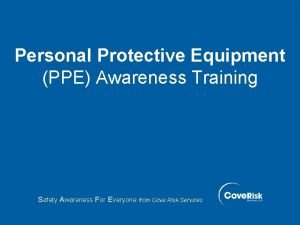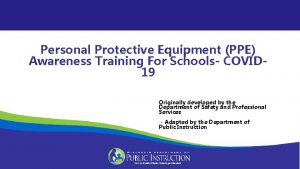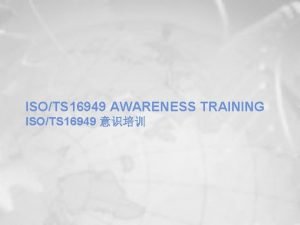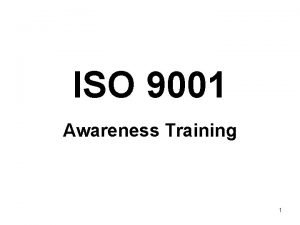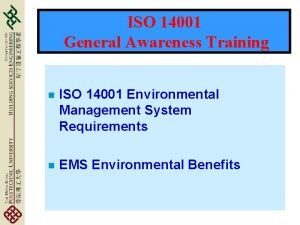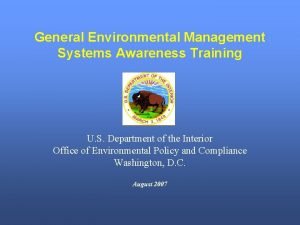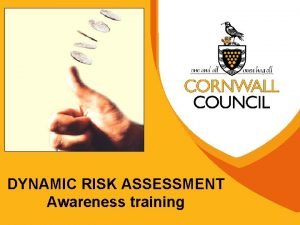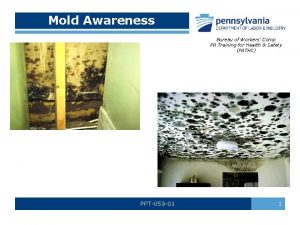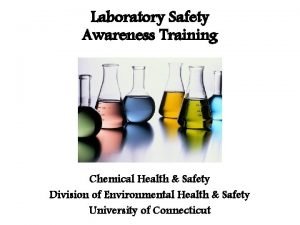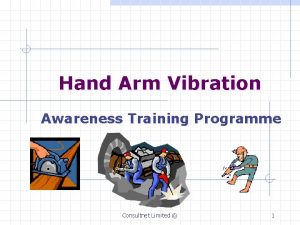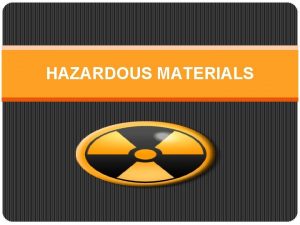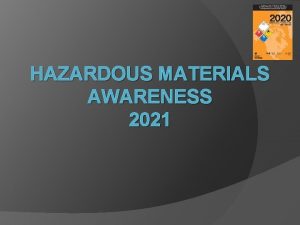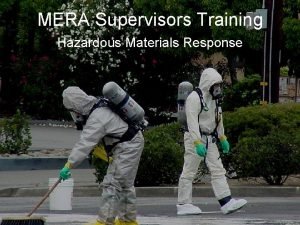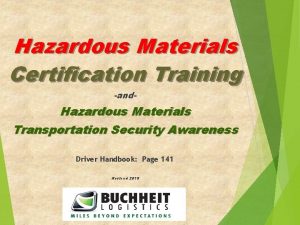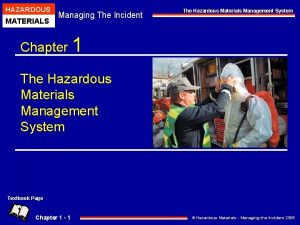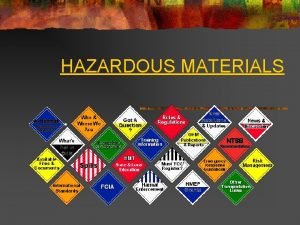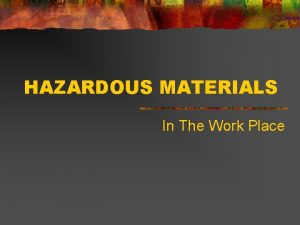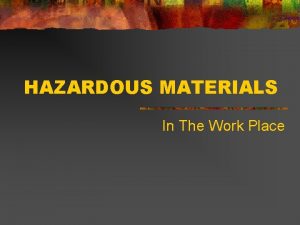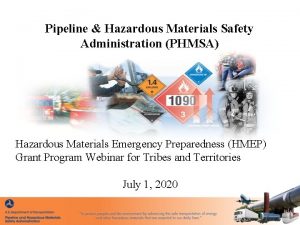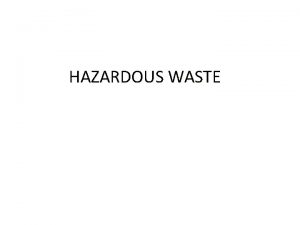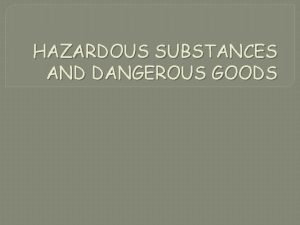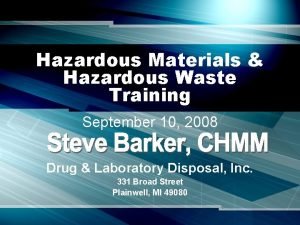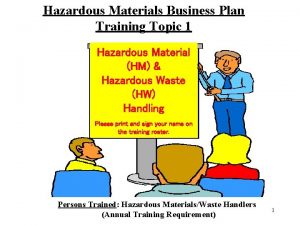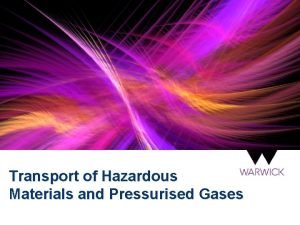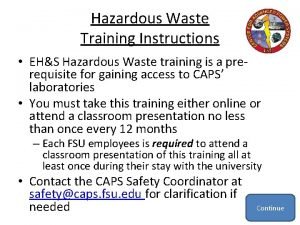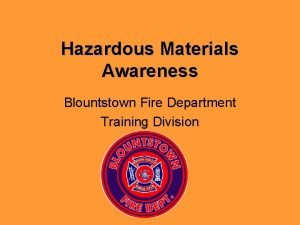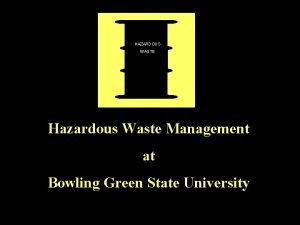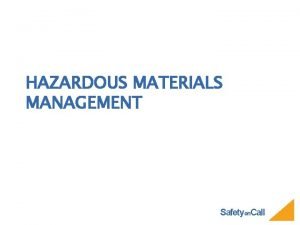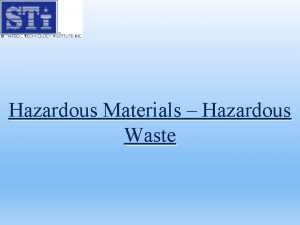HAZARDOUS MATERIALS TRANSPORT AWARENESS TRAINING for UW Green












































- Slides: 44

HAZARDOUS MATERIALS TRANSPORT AWARENESS TRAINING for UW – Green Bay Airline Passengers February 15, 2012

HAZARDOUS MATERIALS TRANSPORT AWARENESS TRAINING Purpose of training: To provide UW – Green Bay airline passengers with a general awareness of the requirements of air transport of hazardous materials

HAZARDOUS MATERIALS TRANSPORT AWARENESS TRAINING • What are hazardous materials? • Overview of hazardous materials transportation legislation and regulations • How to identify hazardous materials • The requirements for hazardous materials transport • How to determine if a material is allowable for passenger transport

WHAT ARE HAZARDOUS MATERIALS? Title 49 of the Code of Federal Regulations (CFR), Part 171, Section 8 49 CFR 171. 8 The definition of HAZARDOUS MATERIALS includes those materials designated by the Secretary of the Department of Transportation (DOT) as posing an unreasonable threat to the public and the environment. The term "Hazardous Materials" includes all of the following: (1) Materials identified in 49 CFR 172. 101, (2) Materials meeting the definitions contained in 49 CFR Part 173, (3) Hazardous Wastes, (4) Marine Pollutants, (5) Elevated Temperature Material (6) Hazardous Substances.

EXAMPLES OF HAZARDOUS MATERIALS Household goods: • Oven cleaner • Paint • Turpentine • Alcoholic beverages • Lighter fluid • • Nail polish remover Shoe polish Weed killer Batteries

EXAMPLES OF HAZARDOUS MATERIALS Sporting equipment: • Camp stove fuel (kerosene, propane, etc. ) • Ammunition • Scuba diving tanks • Lighter fluid • Insecticides (most mosquito repellants, DEET) • Self-inflating life rafts • Charcoal briquettes

EXAMPLES OF HAZARDOUS MATERIALS Scientific/teaching equipment: • Most laboratory chemicals • Dry ice • Biological samples • Acids

THE HAZARDOUS MATERIALS TRANSPORTATION ACT OF 1974 The HMTA created regulations to govern: • • • Packaging of hazardous materials Marking of hazardous materials containers Labeling of hazardous materials containers Transportation of hazardous materials in commerce Placarding of transport vehicles Several additional issues

REGULATIONS FOR THE TRANSPORT OF HAZARDOUS MATERIAL. . . • Written by the U. S. Department of Transportation (DOT) • Found in Title 49 of the Code of Federal Regulations (CFR) • For air transport, also see: – International Civil Aviation Organization (ICAO) Technical Instructions – International Air Transport Association (IATA) Dangerous Goods Regulations

HAZARDOUS MATERIALS REGULATIONS Subchapter C (49 CFR Parts 171 – 179) • Part 175: Carriage by Aircraft – 175. 10: Exceptions for passengers, crewmembers, and air operators

HOW TO IDENTIFY HAZARDOUS MATERIALS Hazardous materials identification systems: Labels • Consumer Product Safety Commission (CPSC) labels • National Fire Protection Association (NFPA) 704 rating system • Hazardous Materials Identification System (HMIS) • DOT Hazard Classifications System • UN # There are others…. .

HOW TO IDENTIFY HAZARDOUS MATERIALS Hazardous materials identification systems: Labels CPSC signal words: • Danger • Warning • Caution • Poison

HOW TO IDENTIFY HAZARDOUS MATERIALS TWO OF THE MOST COMMON HAZARDOUS MATERIALS LABELING SYSTEMS: NFPA 704 rating system HMIS®


HOW TO IDENTIFY HAZARDOUSMATERIALS Examples of NFPA and HMIS® labels

IS IT A HAZARDOUS MATERIAL? HMIS or NFPA labels indicate it may be hazardous

DOT Hazard Classification System

DOT HAZARD CLASSIFICATION SYSTEM

PACKAGE LABELS &MARKINGS UN numbers:

IS THIS A DOT HAZARDOUS MATERIAL? Yes, if it has a “UN” number, which refers to the DOT Hazardous Materials Table

RECOGNIZING PACKAGES OF HAZARDOUS MATERIAL. . . Look for a Haz. Mat labels

IS IT A HAZARDOUS MATERIAL? If any material has any kind of “hazard” label, it is an indication that it might be a hazardous material • • • CPSC: caution, warning, danger NFPA 704 label HMIS DOT hazard classification number UN number There are others…. . ?

HAZARDOUS MATERIALS TABLE 49 CFR 172. 101 Identifies and classifies hazardous materials

IS THIS A DOT HAZARDOUS MATERIAL? Yes, if it is listed in the DOT Hazardous Materials Table

HAZARDOUS MATERIALS TABLE Columns 1 – 5 contain the information needed to identify and classify the material on the shipping paper

HAZARDOUS MATERIALS TABLE 49 CFR 172. 101 Columns 6 – 10 of the Hazardous Materials Table contain information necessary for the proper packaging, labeling, marking, placarding and mode-specific requirements. The modes of transportation are air, water, rail and highway.

HAZARDOUS MATERIALS TABLE Column (9) – Quantity limitations Columns 9 A and 9 B specify the maximum quantities that may be offered for transportation in one package by passenger-carrying aircraft or passengercarrying rail car (Column 9 A) or by cargo aircraft only (Column 9 B). If the material is not allowed on that mode of transportation, the word ‘forbidden’ is entered in that column

AIRLINES AND FLAMMABLE GASES The Department of Transportation Hazardous Materials Regulations forbid the carriage of butane or other flammable gas products on passenger aircraft. Do not pack any flammable gas torches in checked or carry-on baggage. Torches come in many shapes and sizes, but all may be dangerous. Even if you think your torch is empty, it may still contain flammable gas vapors that could ignite.

REGULATIONS FOR COMMERCIAL TRANSPORTATION Hazardous materials sent using commercial transportation must comply with Hazardous Materials Regulations, 49 CFR Parts 171 -179. These regulations apply to those who offer, accept, or carry hazardous materials to, from, within, and across the United States. • The HMR include training requirements in several sections of Title 49 CFR • 171. 2: No person may offer or accept a hazardous material for transportation in commerce unless it is properly classed, described, packaged, marked, labeled, etc.

REQUIREMENTS FOR PREPARING AND TRANSPORTING HAZARDOUS MATERIALS… In order to prepare or package a hazardous material for shipment, the HMR requires that you receive specific training in: • Approved packaging materials & procedures • Labeling packages • Marking packages • Preparing shipping papers • Emergency and safety procedures

REQUIREMENTS FOR PREPARING & TRANSPORTING HAZARDOUS MATERIALS Classification & packaging • Classify • Package • Mark • Label • Placard • Description on shipping papers

TAKE HOME MESSAGE…. . • If you suspect that you might have something that is a hazardous material, you need to pay attention and seek further information before you travel with it… • But preparing a hazardous material for shipment is very different than bringing something along on a passenger aircraft

PASSENGER TRAVEL • 49 CFR 175. 10 - Exceptions for passengers, crewmembers, and air operators. In general, Federal regulations prohibit passengers and crewmembers from carrying hazardous materials aboard an aircraft. However, exceptions are made for some personal hazardous materials

PASSENGER TRAVEL 49 CFR 175. 10(a)(1)(i) revised: “Non-radioactive medicinal and toilet articles for personal use…. . ”

PASSENGER TRAVEL

PASSENGER TRAVEL Citation is now: 49 CFR 175. 10(a)(18)

PASSENGER TRAVEL

PASSENGER TRAVEL

FAA ENFORCEMENT When it comes to airplane regulation, safety truly is the first priority. Civil penalties for passenger failure to comply with FAA hazardous materials regulations can be high, e. g. up to $27, 500 per each violation.

FAA ENFORCEMENT • FAA considers whether conduct is intentional, reckless, careless, or systemic as well as the safety risks when determining the penalties. • Failing to declare prohibited hazardous contents in either carry-on or checked luggage is considered intentional conduct for FAA enforcement purposes.

RESOURCES http: //www. faa. gov/about/office_org/headquarters_offices/ash_programs/hazmat/passenger_info/

RESOURCES http: //www. tsa. gov/travelers/airtravel/prohibited/permitted-prohibited-items. shtm

RESOURCES • http: //www. tsa. gov/travelers/index. shtm • http: //www. faa. gov/about/office_org/headquarters_ offices/ash_programs/hazmat/passenger_info/ • http: //safetravel. dot. gov/ • http: //www. iata. org/whatwedo/cargo/dangerous_go ods/pages/faq. aspx

RESOURCES If you have any questions…. . contact us Jill Fermanich email: fermanij@uwgb. edu Phone: 2273 Jennifer Sloan Lattis email: jlattis@uwsa. edu Phone: (608) 262 -0747
 Pa-psfa-hazardous materials awareness
Pa-psfa-hazardous materials awareness Privacy awareness and hipaa privacy training cvs
Privacy awareness and hipaa privacy training cvs Hazmat material table
Hazmat material table Hazardous materials table
Hazardous materials table Us military marking system for hazardous materials
Us military marking system for hazardous materials What shape and color are the whmis 2015 symbols
What shape and color are the whmis 2015 symbols Certified hazardous materials manager
Certified hazardous materials manager Hazardous materials transportation act of 1975
Hazardous materials transportation act of 1975 Hazardous materials managing the incident
Hazardous materials managing the incident Hazardous materials reference books
Hazardous materials reference books Stanislaus county hazardous materials division
Stanislaus county hazardous materials division Pipeline and hazardous materials administration
Pipeline and hazardous materials administration Hazardous materials incident report
Hazardous materials incident report Hazardous materials business plan
Hazardous materials business plan Hazardous materials managing the incident
Hazardous materials managing the incident Osha 1910 psm
Osha 1910 psm Show me green
Show me green Hazardous area training darwin
Hazardous area training darwin Primary vs secondary active transport
Primary vs secondary active transport Active transport
Active transport Passive transport vs active transport venn diagram
Passive transport vs active transport venn diagram Active vs passive transport venn diagram
Active vs passive transport venn diagram Unlike passive transport, active transport requires *
Unlike passive transport, active transport requires * Primary active transport vs secondary active transport
Primary active transport vs secondary active transport Bioflix activity membrane transport active transport
Bioflix activity membrane transport active transport Active transport diagram
Active transport diagram Bioflix membrane transport
Bioflix membrane transport The removal and transport of weathered materials from
The removal and transport of weathered materials from Iso 9001 presentation
Iso 9001 presentation Suspicious package awareness training
Suspicious package awareness training Ncic restricted files list
Ncic restricted files list Abuse prevention training quiz answers
Abuse prevention training quiz answers Ppe awareness training
Ppe awareness training Ppe awareness training
Ppe awareness training Sogedac
Sogedac Iso 9001:2015 awareness training
Iso 9001:2015 awareness training Iso 14001 awareness training
Iso 14001 awareness training Which of the following are reportable behavioral indicators
Which of the following are reportable behavioral indicators Security education and training programs
Security education and training programs Environmental management system awareness training
Environmental management system awareness training Dynamic risk assessment training
Dynamic risk assessment training Mold awareness training
Mold awareness training Ozone hazard symbol
Ozone hazard symbol Signs of dysphagia
Signs of dysphagia Vibration awareness training
Vibration awareness training
